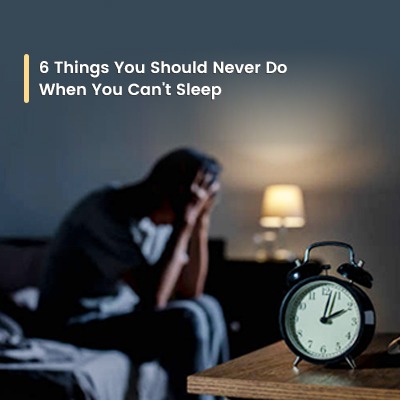6 Things You Should Never Do When You Can’t Sleep
We’ve all been there. The moment when you can’t seem to get to sleep, when you’re restlessly twisting and turning in bed, staring at the ceiling, when you have that exasperating feeling of being exhausted but wide awake. The longer you lie there, the more aware you become of how long you’ve been awake, how time is ticking by and, knowing that you have to get up early, you realise that tomorrow is going to be rough if you don’t get some sleep soon. And so, in desperation, you reach for your phone or start counting sheep. But there are actually quite a few things you could do before counting sheep that are worse. In this list, I’m going to tell you the six things you absolutely should not do if you can’t sleep.
1.Don’t Reach for Your Phone
Who wouldn’t think at least for a split second – oh, just reach for my phone. It’s there. I wonder what’s on it. I bet it would help me sleep! But you should never, ever, reach for your phone when you can’t sleep. Besides the obvious time suck and distraction, blue light from phones, tablets and laptops suppresses the production of melatonin – a hormone that helps to maintain your sleep-wake cycle. You want to look at your phone at night? You want to watch videos or check social media? OK, your brain will get the message and stay awake a bit longer too.
For instance, just two hours of blue-light exposure at night can lower melatonin levels by 22 per cent. If you want to fall asleep faster, leave your phone elsewhere.
2.Avoid Staring at the Clock
But if you’re looking at the clock, your attention is being drawn to the passing time which may be increasing your anxiety and stress or making you more worried about sleep – all of which might be keeping you even more awake and making it harder to fall asleep. Instead of encouraging sleep, you are putting pressure on yourself and this may start a vicious circle of more wakefulness and more worry. Your attention is on all the sleep that you are losing instead of focusing on sleep itself.
Questions to consider: Next time you look at the clock and find yourself falling asleep slowly, ask yourself: have you ever found that time seems to speed up when you open your eyes to check the clock, and then slows down after you close them again, like it took longer to fall asleep the second time than before you checked?
3.Don’t Stay in Bed If You’re Wide Awake
This might seem counterintuitive, but spending your time awake in bed is a way of training your brain to associate your bed with wakefulness instead of sleep. If you haven’t fallen asleep after 20 minutes in bed, it is better to get up and do something calming – such as reading a book (from paper rather than a screen!) or listening to music. Make sure it is not stimulating, as your brain needs to know it is time to switch off.
Expert tip: Make your bedroom an inviting space to sleep on. Shop HomePrimeStore for top-notch bedding that’ll help you make your sleep nook a cozy haven.
4. Avoid Drinking Caffeine Late in the Day
This one might seem obvious, but it’s worth repeating. Caffeine is a strong stimulant, and if you have some too late in the day it can interfere with your sleep. What might surprise you is that caffeine can stay in your system for up to eight hours! And it’s this late afternoon coffee run that’s keeping you awake at night.
Fun Fact: You might think that decaf means no caffeine, but even decaf coffee contains a small amount of the stimulant – not enough to keep most people awake but possibly still tweaking their jitters if they are sensitive.
5. Don’t Rely on Alcohol to Fall Asleep
The idea that a nightcap helps you sleep. As alcohol makes you feel drowsy to begin with, some consumers have the notion that it ‘helps sleep’, but in reality, it makes sleep poorer. Alcohol reduces the amount and quality of your rapid eye movement (REM) sleep, the stage of sleep usually associated with dreaming, and important in memory consolidation, mood regulation, psychomotor skills and learning. Furthermore, while alcohol makes you sleepy, it can prevent you from entering the deeper stages of sleep and it can also disturb a natural sleep cycle because it is ending without you waking up, but rather being ‘medicated to sleep’. Indeed, one of the most common problems for those trying to reduce their alcohol intake is that they’ve become so dependent on alcohol for sleep that they struggle when they try to stop.
Questions to consider: the next time you drink heavily, notice how you feel – tired, unrested, dull – when you wake up in the morning. Alcohol doesn’t cure insomnia. It just makes you fall asleep.
6. Avoid Eating Heavy Meals Before Bed
Trying to sleep soon after eating a full meal might make you downright uncomfortable – and nothing produces indigestion like upset stomach. After you have eaten, your body requires time to digest food – and then there is that great trick known as acid reflux. When you lie on your back with a full stomach, your food easily moves back up into your throat, resulting in heartburn. If you are somewhat hungry before bedtime, try an easy-to-digest snack like a banana or a small bowl of oatmeal.
Expert Tip: Time it right. Have dinner at least three hours before bedtime; then your body has time to digest and should be comfortable, so you don’t wake up.
Final Thoughts
Sleep is widely connected to our health, so it’s important to know what not to do when faced with sleeplessness, as well as know all the good habits that go alongside having a bedtime routine. Mostly, helping yourself achieve even better sleep depends on your habits and the environment you create for yourself. If your bedroom is calm and comfortable, then even if you are having trouble falling asleep, you’ll have a calming environment that can help. Get more information about this topic and you could very well be well on your way to getting more and better sleep with the use of some nice new bedding. In fact, check out HomePrimeStore.
Eliminate these six sleep saboteurs and you’ll be well on the track to better slumber. Sweet dreams!







